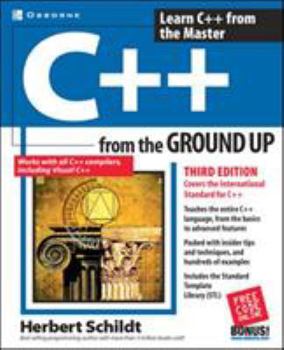C++ from the Ground Up
Select Format
Select Condition 
Book Overview
This excellent primer provides a plethora of C++ programming information for beginning to intermediate users on topics like classes, objects, expressions, arrays, pointers. Plus, it also covers advanced topics like inheritance, namespaces, STL, custom string class, and the Standard C++ Class Library. For users of all levels, this guide teaches with examples of source code and a thorough display of the results.
Format:Paperback
Language:English
ISBN:0072228970
ISBN13:9780072228977
Release Date:March 2003
Publisher:McGraw-Hill Education
Length:624 Pages
Weight:2.20 lbs.
Dimensions:1.3" x 7.0" x 9.5"
Customer Reviews
4 ratings
For the skill level, it meets its goal
Published by Thriftbooks.com User , 20 years ago
The book says specifically that it is written for beginner to intermediate level. This book meets that goal very well. I have an BS in computer science and I have worked in industry as a developer for over 6 years, several of these using C++. I brought this book, because I learned C++ by using it. Therefore, I only used a small subset of C++'s capabilities in my job, and I really wanted to know the language well. There are several things that need to be taken into account when trying to learn C++. First, the authors of the actual C++ language estimate that it will take 6 months - 1 1/2 years to truly learn C++. Second, all college level computer science students take a class in algorithms, datastructure, object oriented programming, file systems, and software engineering. Chapters 1 - 9 cover the material that is usually taught in a standard "algorthims" class. Chapters 10 - 15 would cover the material that would be expected in a hands on object oriented programming class. Chapters 16 - 22 would cover the material in an advanced C++ class. Even after you finish this book, your education is not complete. This book only covers 1/3 of what is actually in the C++ language standards. "The C++ Standard Library" will teach you about STL: Standard Template Library -- material taught in a standard data structures class, and is another 1/3 of the language standards. Then you will need "Standard C++ IOStreams and Locales". This will cover the last 1/3 of the C++ langauge standards, file systems. Finally, you will need a book about interfacing with databases, so you can save the data, and GUI, so you can interface with the user.I don't mean to discourage anyone from learning C++. I just wanted to provide realistic expectations. Starting at Chapter 6, I have been going through this book slowly, and I have been learning a lot about the details of C++. The book will not teach a person how to write algorithms or how to write object oriented code. It will just teach you how to do it in C++. Therefore, if you don't know the theory of these ideas, you will need a book to explain the theory.
Solid and thorough introduction to C++
Published by Thriftbooks.com User , 23 years ago
I found this an excellent beginner-level intro to C++, and yet still a fairly complete tour of the language. Only the Standard Template Library wasn't covered in depth, but even then, the most commonly-used STL classes were clearly explained. It's easy and quick reading; I read it cover to cover in about a week. I've read several reviews of books in the "from the ground up" series that complained that they were too advanced; if so, this book is an exception. I had only a rudimentary knowledge of C++ when I picked it up, but I found it very easy to follow. I recommed it highly.
A book that make Complex C++ understand easy.
Published by Thriftbooks.com User , 25 years ago
I have read more than 10 books on C++ and found this book very easy to understand, particularly for Beginners and Intermediate C++ programmers. This book primarily writes from the compilers point of view. It doesn't just tell you how to write a C++ code but also tells you how a compiler treats your written code & talks extensively about how the compiler actually implements the user written code and this is what makes a programmer make very few mistakes while writing the code. Author has written this book keeping in view the beginners & intermediate C++ programmers and he has done an excellent work by making the complex C++ look very easy.
Solid C++ introduction
Published by Thriftbooks.com User , 25 years ago
Great explanation and exemplification of pointers. I started with Horton's Beginning Visual C++, and got bogged down with the pointer stuff. Then I began reading Schildt, and he made it all seem so easy and clear that I just kept reading. I have only some minor gripes. 1) The example programs are often repeated with only minor modifications, which are not highlighted --- they're buried in the code; 2) I haven't checked the errata sheet, but I found it challenging and fun to debug some of Schildt's code (check out page 588 for a real blooper!); 3) The coverage of STL was (necessarily, I suppose) cursory and vague; 4) Schildt never gives a clear explanation of things like "template >class list" (p 583) --- these "syntax models" occur late in the book, however, and the examples that follow usually make things pretty clear; and 5) After finishing this book I can supposedly "call [myself] a C++ programmer"(page 637). I can also call myself a wombat --- it ain't necessarily true, though! It was a good read, and I now feel better able to attack Horton.




